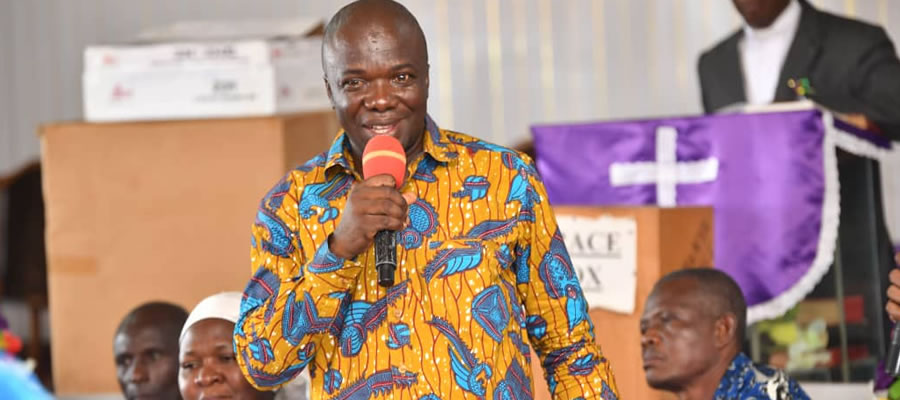

Monitoring and Evaluation
Institutional Arrangements for Implementation, Monitoring and Evaluation
At the District level, the activities of monitoring and evaluating are the responsibilities of the District Planning Coordinating Unit [DPCU] and the District sector agencies. The DPCU is responsible specifically for the preparation of monitoring and evaluating procedures, as well as the monitoring and evaluation of the plan implementation.
It is also the responsibility of the District Assembly to make adequate provision for the resourcing the District Planning Coordinating Unit to be able to carry out with the monitoring and evaluation of the implementation of the District medium term development plan.
The District Assembly must also ensure that the extended DPCU is in operation and meetings and action are taken on current issues pertaining to the Development of the District.
The DPCU must also have a comprehensive programme for the monitoring of all activities relating to the implementation of the District Medium term Development. In addition the District should be able to coordinate the activities of other development partners and NGOs in order to avoid the duplication of development projects waste of resources
The District Assembly must also task the DPCU to put in proper evaluation mechanism of the various projects and programmes. Is it only there that the proper impact of the projects could be assessed on the beneficiaries. This will also assist the design and implementation of future programmes and projects to have the maximum and the desired impact on the beneficiaries.
This section of the implementation aspect of the District Development plan, deals with administrative and institutional issues, which need to be tackled to ensure effectiveness in the implementation of the plan. The issues discussed include structure, procedures and roles.
Detailed specification of roles of the District Assembly, the community, public and private sector agencies, including NGOs have been specified in the medium and short term (annual) plan as indicated in the preceding sections. Thus this section focuses on improvements in current arrangements, including capacity building and measures to improve the efficiency in performance.
Current government policies of decentralization indicate that district assemblies, as planning authorities, are fully responsible for the formulation, implementation, monitoring & evaluating of policies, programmes and projects. This means that the District Assembly together with all its agencies or departments are responsible for assessment of project impact.
To be able to implement the programmes and projects successfully, the Manya Krobo District Assembly needs financial and human resources, which can be mobilized both from within and outside the District. Much as the District is encouraged to seek funds from NGOs and other donor agencies, it is very important that the District does not overlook its own resource base. The local resource base should be fully assessed and mobilized to give the assembly some financial footing to implement it projects.
The District Assembly is charged with the overall responsibility for the process of implementation and monitoring & evaluating of the development programmes and project. This role can best be performed by tapping available human and technical resources of the District Planning Coordinating Unit, the sub-committees of the Executive Committee, as well as the technical staff of the departments of the Assembly. The District Assembly is to perform the following main function:
The generation and provision of funds for selected programmes and projects
The setting up of the relevance and the framework for coordinating and cooperation among the institutions involved in the implementation of the plan.
The identification and due response to implementation bottlenecks like legal, concession and administrative issues.
The identification, invitation and attraction of potential investors in the District.
The periodic revision of the plan implementation procedures and effective adjustments in response to the changing circumstances.
The formation of a team to be responsible for mobilizing funds from other external sources for development.
The District Assembly departments as major actors in the process of implementation, monitoring and evaluating should provide the technical guidance and facilitate the appropriate procedures for execution of programs and projects.
These are potential sources in the provision of funds, materials, training and machinery for projects. Their presence in the District should be more formalized for the Assembly to benefit from their assistance.
Communities
The communities should offer labour, local expertise and knowledge in project implementation. They should be trained to offer maintenance and other reliable and sustainable measures to implement projects. Local leaders have been found to be useful for community mobilization and education.
Thus, they should be involved to facilitate the participation of all the beneficiaries in the implementation process. The community members should assist the District Assembly to identify and establish links with citizens of the District living abroad for financial assistance.
Central Government
It is the wish of the central government that each district’s development goals and objectives are in consonance with national priority goals and objectives. It therefore exercises some control and responsibilities in the District. It is expected that the Central government will contribute substantially to the District by enhancing and increasing the budget allocation through the Common Fund for the implementation of its development projects.
Arrangements for Funding
Funds from the Central government will be the major source of financing to the District. It is therefore necessary to satisfy the conditions for the release of such funds, especially those for the Common Fund and HIPC relief.
The District’s revenue base is quite strong, but over the years, this potential has never been properly managed. It is necessary to overhaul the entire system of revenue collection. Forming a new task force, provided with appropriate training and motivation to perform, should do this Monitoring and Evaluation.
Developmental Programmes
Upon analysis of the various problems facing the District and with due consideration to its potentials, opportunities, constraints and challenges, the following are some of the key prioritization areas for development:
Summary of community Needs and Aspirations
Before goals are formulated, there is a need to analyze the problems, potentials, constraints and challenges in the light of community aspirations. From information gathered during group discussions organized in communities and with identified groups, the following aspirations were identified for the Manya Krobo community:
The DA formulates and implements programmes on capacity building. They can seek the assistance of NGOs in this direction. This is important in unearthing their skills and talent for further productive activities.
DA financial institutions should identify viable working groups and assist them financially to facilitate expansion and creation of the job possibilities in the District. This must be done after the working groups have been trained and their skills developed.
Road network should be improved within the District. The DA should do this in collaboration with the Department of Feeder and Urban Roads.
Establish an incentive package to attract teachers to the rural areas.
Extension officers should be trained in such numbers that they can reach the ordinary farmer and offer him or her technical advice.
Introduction of irrigation farming where applicable to ensure farming throughout the year. This is important to boost production and improve income from farming.
Reduce taxes and other levies. Officials in charge must critically assess income levels before levying and taxes.
Subsidies should be offered on most inputs of production especially farming inputs.
The Family Planning campaign must be intensified at all levels by the District Health Management Team.
DA should launch a crusade on the need and importance of education.
DA should ensure provision of basic social amenities such as toilets, water and telephone.
DA should support the development of community farms that would produce cash crops.
The DA should support the strengthening of bush fire campaigns and controls through education by chiefs, volunteers and others.
The DA should provide additional health facilities in the most deprived communities.
The DA should implement land reform policies that would make land accessible to the landless farmers.
The DA should encourage and promote large-scale animal husbandry and poultry keeping at the community level.
The DA should adopt measures to make all officials of the District Assembly responsible and accountable.
Development Focus, Goals, Objectives and Strategies
Unfortunately, there are still declining fortunes for the majority of the people in the District. This is due to the fact that poverty is still widespread and pervasive. Assess to basic services need to be improved in the district; whilst technical infrastructures need a major overhaul.
The focus of development in the Manya Krobo District with this mid-term development plan (2006-2009), therefore will be to reduce poverty through the provision of economic and social services, along with the protection of the vulnerable and excluded within a decentralized democratic environment. This will be achieved through the provision of basic social services and economic support infrastructures.
Based on the identified development problems, potentials, constraints and development priorities, and in consonance of the national development objectives (especially those derived from the President’s Special Initiative and the Ghana Poverty Reduction Strategy Paper), the following are the sector specific goals and strategies that will be pursued.
Development Problems
Summary of Key Development Problems
District Economy
Low Internally generated revenue.
Inadequate access to credit.
Delay in the release of the common fund.
Low incomes.
Low production and productivity in all sectors.
Over dependence on agriculture.
Poor financial management practices.
Delay in release of common Fund.
Inadequate employment opportunities.
Private Sector Development
Inadequate private sector investment.
Poor condition of roads.
Inadequate electricity supply.
Undeveloped tourist sites.
Low level of technology.
Human Resource Development and Basic Services
Inadequate provision of potable water.
High rate of illiteracy.
Poor health conditions.
Inadequate educational facilities.
Inadequate toilet facilities.
Poor waste disposal.
Low enrolment rate.
High rate of HIV/AIDS prevalence.
Good Governance
Inadequate personnel in the judicial system.
Lack of proper co-ordination between public, private and civil society organizations.
Malfeasance within the District Assembly.
Weak capacity of Sub-District Structures.
Other Problems Related to Governance
Some other problems related to governance are inadequate security services and inadequate residential accommodations for the security service. There are currently chieftaincies and even District overall jurisdiction disputes that have led to an inability of the Assembly to focus on developmental concerns, but instead at times focus on internal conflicts.
As with other Districts, the challenge of fully incorporating decentralization has yet to take hold. The incomplete decentralization needs to be addressed to better utilize the valuable trained personnel in each of the decentralized areas.
There is inadequate public / private partnership in the District development. There are a significant number of people within the District who could contribute greatly, but who lack the knowledge of the Constitution and District Assembly policies to be effectively involved. Decision making within the District Assembly is currently not structured to maximize participation of many, but rather, relies on a few key individuals.
Date Created : 11/26/2017 2:34:33 PM













 facebook
facebook
 X
X
 Youtube
Youtube
 instagram
instagram
 +233 593 831 280
+233 593 831 280 0800 430 430
0800 430 430 GPS: GE-231-4383
GPS: GE-231-4383 info@ghanadistricts.com
info@ghanadistricts.com Box GP1044, Accra, Ghana
Box GP1044, Accra, Ghana